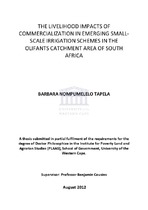The livelihood impacts of commercialization in emerging small-scale irrigation schemes in the Olifants catchment area of South Africa.
Abstract
This thesis examines livelihoods in the wake of agricultural commercialization under the Revitalization of Smallholder Irrigation Schemes (RESIS) Programme and similar revitalization initiatives within the Olifants River Basin in Limpopo Province. The focus is on contractual joint ventures and strategic partnerships implemented within selected smallholder irrigation schemes. The thesis is based primarily on in-depth empirical studies conducted between October 2003 and March 2009 in three sites located in two Integrated Sustainable Rural Development Programme (ISRDP) poverty nodes namely, Greater Sekhukhune and Vhembe Districts. To a lesser extent, the thesis draws on findings from rapid appraisals of five additional study sites in Greater Sekhukhune District. Research findings showed that the performance of joint ventures and strategic partnerships had so far largely fallen short of expectations. With the exception of a minority of smallholders involved in RESIS-Recharge strategic partnerships, the promise of higher incomes and improved livelihoods had often remained elusive, while debts and potential losses of often meagre household assets loomed large, threatening to erode existing livelihoods and undermine government interventions. This was mainly because ‘viability’ in both the RESIS and RESIS-Recharge phases was narrowly seen in economic and technical terms, such that reduction of transaction costs often entailed the divesting of responsibilities to address issues of rural poverty and inequality. Subsistence production had largely given way to commercially-orientated farming, and weak monitoring of contract formulation and implementation meant that voices of marginalized poor and vulnerable people, particularly women and the elderly, were not being heard. Research findings further revealed that while RESIS-Recharge strategic partnerships increased incomes for a minority of smallholders, such arrangements did not meaningfully improve the productive, managerial and marketing skills of smallholders to ensure their effective participation in agriculture. Rather, strategic partnerships were creating a small class of black ‘arm-chair’ farmers, who played little or no active role and obtained few or no skills in commercial farming but perpetually depended upon and drew incomes from agribusiness initiatives run by externally-based agents. Adjunct to questions of sustainability for these farmers’ ability to participate in commercial farming, the thesis raises the question: What is the rationale for joint ventures and strategic partnerships in the context of South Africa’s Agricultural Sector Strategy objectives for support to black farmers? Contracts lacked mechanisms for equitable distribution of costs and benefits between contracted private partners and targeted smallholders, on the one hand, and the rest of members of local communities, on the other hand. Contracts also lacked provisions for postproject recapitalization of infrastructure and rehabilitation of degraded land. This raised questions about the longer term sustainability of productivity, natural resource base and livelihood security in smallholder irrigation schemes. The conclusion of this thesis is that the challenge of reducing rural poverty and inequality in smallholder irrigation schemes might not be resolved through existing institutional approaches to agricultural commercialization.

